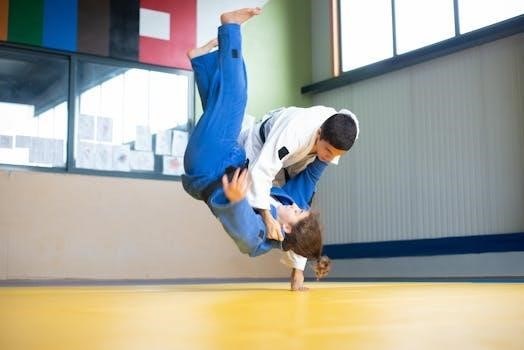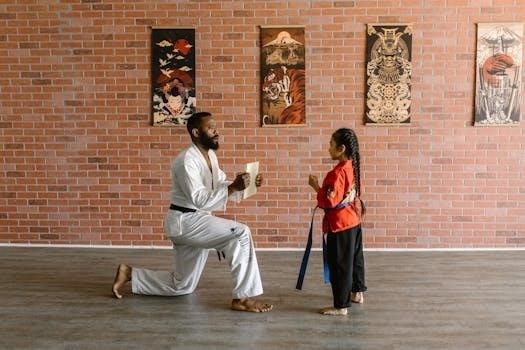Verbal Judo PDF⁚ An Overview
Verbal Judo is a tactical communication method focused on de-escalation and generating voluntary compliance. A Verbal Judo PDF offers accessible insights into techniques. These techniques help to enhance communication skills and prevent conflict escalation. It provides strategies applicable to diverse scenarios.
Verbal Judo, developed by Dr. George Thompson, is a communication technique designed to de-escalate conflicts and gain voluntary compliance. It’s based on the principle that the most powerful weapon isn’t physical force, but the ability to use words effectively. The core aim is to influence individuals towards a desired outcome while maintaining respect and avoiding unnecessary confrontation.
The Verbal Judo PDF serves as an introductory resource, outlining the fundamental concepts and strategies of this method. It emphasizes active listening, empathy, and clear communication to manage resistance. The techniques are applicable in various settings, including law enforcement, customer service, and personal relationships. Understanding Verbal Judo empowers individuals to navigate challenging interactions with greater confidence and control.
The Core Principles of Verbal Judo
Verbal Judo’s core emphasizes communication to de-escalate situations and gain voluntary compliance. Key principles include empathy, respect, and understanding. The aim is to influence behavior through tactical language. It prioritizes safety for all involved.
Generating Voluntary Compliance
The main theme of Verbal Judo is generating voluntary compliance through verbal persuasion, influencing others to your way of thinking. It’s a gentle yet powerful way to avoid, resolve, and manage resistance using presence and words, whether resolving conflict or closing a deal. Verbal Judo emphasizes empathy, dignity, and respect, aiming to encourage compromise and avoid negative situations for all parties involved.
Officer Sean Collins notes that many have unconsciously practiced these techniques. The essence lies in influencing behavior and creating a win-win scenario. By understanding and employing these methods, individuals can effectively de-escalate tense situations.
Maintaining Control Through Communication
Maintaining control through communication in Verbal Judo involves using specific techniques to guide interactions. Instead of reacting defensively, officers use the Verbal Judo technique which involves an eight-step traffic stop. This method ensures the officer maintains control by strategically managing the conversation’s flow.
Verbal Judo focuses on preventing escalations and achieving desired outcomes through tactical language. By employing reframing techniques, officers can shift focus to future solutions rather than dwelling on past issues. Effective communication helps de-escalate tense situations and encourages cooperation. This skill is invaluable in high-stress environments.

Key Techniques in Verbal Judo
Key techniques in Verbal Judo include active listening, paraphrasing for understanding, and reframing techniques. These strategies help to de-escalate tense situations. They also help to foster better communication and achieve voluntary compliance.
Active Listening
Active listening, a cornerstone of Verbal Judo, emphasizes focusing intently on the speaker. It requires putting as much effort into listening as you do into talking. This technique helps to accurately understand the other person’s perspective and emotions; It also helps to demonstrate empathy and build rapport. By fully engaging with the speaker, you can identify the core issues and respond in a way that addresses their concerns.
Active listening involves non-verbal cues like maintaining eye contact and nodding. It also involves verbal affirmations such as “I understand” or “Tell me more”. These elements help create a safe space for open communication, fostering trust and de-escalating potential conflicts.
Paraphrasing for Understanding
Paraphrasing is a critical technique in Verbal Judo. It ensures mutual understanding and minimizes misinterpretations. This involves restating what the other person has said in your own words. It helps to confirm that you have correctly understood their message.
To paraphrase effectively, use phrases like, “Let me be sure I understand you.” Then, summarize their statement, focusing on their key words. Remember that different words can have different meanings to different people. Paraphrasing also demonstrates that you are actively listening and engaged in the conversation. It shows respect for the speaker’s perspective and encourages them to clarify any misunderstandings. This technique helps in conflict resolution and effective communication.
Reframing Techniques
Reframing is a key technique in Verbal Judo that involves changing the way a situation is perceived. It shifts the focus from negative aspects to potential solutions or positive outcomes. Reframing helps de-escalate tense situations by offering a different perspective.
By employing reframing techniques, you can redirect the conversation towards constructive dialogue. For example, instead of dwelling on past mistakes, you focus on future solutions. This approach encapsulates the essence of Verbal Judo, promoting compromise and mutual understanding. Reframing can involve reinterpreting the other person’s statements. It can also highlight shared goals or common ground. This encourages cooperation and reduces conflict.

Verbal Judo in Practice
Verbal Judo is used practically to defuse tense situations. It can also be used to encourage compromise in conflicts. It is applicable in law enforcement and daily interactions. The goal is avoiding escalation.
De-escalation in High-Stress Scenarios
Verbal Judo offers techniques to de-escalate high-stress situations effectively. These strategies inoculate individuals against heightened emotional states, promoting calm and reasoned responses. By employing active listening and reframing, Verbal Judo helps to redirect potentially volatile interactions towards peaceful resolutions. It prioritizes maintaining control through communication, preventing situations from spiraling out of control. The techniques focus on understanding the other person’s perspective, fostering empathy, and finding common ground.
Verbal Judo emphasizes avoiding personalization of attacks and diffusing tension by using tactical language. This approach enables individuals to navigate challenging encounters while preserving respect and dignity. Ultimately, it aims to transform conflict into cooperation.
Application in Law Enforcement
Verbal Judo finds significant application in law enforcement, equipping officers with essential de-escalation techniques. It emphasizes that the officer’s tongue is a powerful tool. These skills promote voluntary compliance and minimize the need for physical force. Verbal Judo teaches officers how to maintain control during interactions, effectively managing potentially volatile situations. The eight-step traffic stop technique exemplifies how officers can guide interactions positively.
By employing active listening and paraphrasing, officers can ensure understanding and build rapport. Verbal Judo promotes empathy, respect, and dignity, fostering positive community relations. The techniques help to neutralize arguments, deflect insults, and redirect negative energy, ensuring safety and security. Ultimately, it enhances professional performance.

Benefits of Learning Verbal Judo
Learning Verbal Judo enhances professional performance and improves personal relationships. It’s an invaluable life skill. Verbal Judo techniques enable individuals to perform professionally under pressure. It also can save personal relationships with important people in your world.
Enhancing Professional Performance
Verbal Judo is crucial for enhancing professional performance across various sectors, including law enforcement, customer service, and leadership roles. The techniques provide a structured approach to de-escalate tense situations and foster cooperation. Professionals can use verbal judo to maintain control through communication, ensuring that interactions remain productive and respectful.
By mastering active listening, paraphrasing, and reframing, individuals can effectively manage resistance and guide conversations toward positive outcomes. This leads to improved conflict resolution skills, increased efficiency, and a more positive work environment. Verbal Judo also helps build stronger relationships with colleagues and clients, fostering trust and mutual understanding. Ultimately, it equips professionals with the tools to handle challenging interactions with confidence and achieve their goals while minimizing stress and conflict.
Improving Personal Relationships
Verbal Judo offers invaluable tools for improving personal relationships by fostering better communication and understanding. The core principles, such as empathy, respect, and active listening, enable individuals to navigate conflicts constructively. By using techniques like paraphrasing and reframing, people can ensure they truly understand each other’s perspectives, reducing misunderstandings and building stronger connections.
Verbal Judo helps in de-escalating tense situations within families and friendships. By focusing on empathy and respect, individuals can foster understanding and resolve conflicts peacefully. It provides effective strategies for managing disagreements and promoting cooperation. This, in turn, leads to more harmonious relationships built on trust and mutual respect. Mastering these skills can transform personal interactions, creating a more supportive and fulfilling environment for everyone involved. Verbal Judo is a way to improve personal relationships with the most important people.

Resources for Learning Verbal Judo
Learning Verbal Judo can be achieved through various resources. These include Verbal Judo PDF availability, which provide foundational knowledge. Furthermore, training courses and workshops offer practical, hands-on experience. These resources are crucial for mastering Verbal Judo.
Verbal Judo PDF Availability
Accessing Verbal Judo knowledge is made convenient through the availability of Verbal Judo PDFs. These digital resources offer a wealth of information, outlining core principles and key techniques. A Verbal Judo PDF often contains strategies for de-escalation. The PDF also includes methods for generating voluntary compliance.
Many online platforms provide access to these PDFs, sometimes freely or for purchase. These resources allow individuals to study Verbal Judo at their own pace. They can also refer back to the material as needed. These PDFs serve as valuable tools. They reinforce learning from training courses or workshops.
Ensure the PDF originates from a reputable source. This will ensure the accuracy and completeness of the information. Look for authorized distributors or the official Verbal Judo Institute.
Training Courses and Workshops
To delve deeper into Verbal Judo, training courses and workshops provide structured learning experiences. These sessions are often led by certified instructors. The courses offer practical exercises and real-world simulations to hone communication skills. Participants learn how to apply Verbal Judo techniques in various contexts. These contexts include law enforcement, customer service, and personal relationships.
Workshops and courses usually cover active listening, paraphrasing, and reframing techniques. They help participants understand how to de-escalate tense situations and maintain control through communication. Many courses also incorporate role-playing scenarios. These scenarios help individuals practice applying verbal judo under pressure.
Look for courses certified by the Verbal Judo Institute for the most authentic and effective training. These courses will ensure that participants gain a comprehensive understanding.